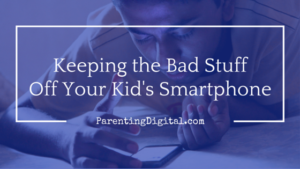One of the most common questions I hear parents struggle with is “How old should my child be before I give him or her a phone?”
The very next question is usually, “How do I keep all the bad stuff off of it?”

Like most decisions, every tween or teen differs in their maturity, responsibility, and readiness for their own phone. It’s a tricky balance, to be sure.
Once they do have a phone, especially a smartphone (i.e. iPhone, Android, etc.), there are some steps that parents can take to prevent a lot of questionable content and apps.
And it starts with…
Don’t give them a smartphone
Seriously, until they are older and have established trust, they don’t need the latest iPhone or a Samsung Galaxy. As an educator in multiple K-12 school buildings, I’m amazed at how many younger kids I see who have smartphones. And I cringe to think of how little they are monitored, or how little their parents even know what’s on their phones.
The most common reason parents give for handing over a smartphone?
What if they need to get hold of me, or I need to get a hold of him?
Get a basic flip phone with a basic texting package. It’s (usually) cheaper adding one to your plan, and it has the essentials you and your child need.
My son is entering high school next year, and we are just now considering getting him a smartphone. He actually has one of my old iPhones that he uses around the house or on car trips. It’s a wifi-only device right now, but it has given us many opportunities to talk about acceptable use and proper care of the gadget.
Establish the expectations first
It’s concerning to think just how many of us hand over a smartphone, with unfettered access to the web and social media, to our kids.
Be very clear what the purpose is for having the phone in the first place. It’s a tool, not a gaming device. It’s for keeping in touch with the people you know, not sharing yourself with the entire world. Things like that.
Put these expectations in writing in the form of a contract.
Here are a few key things to include:
- That is my phone and I’m letting you use it. I pay for it (or part of it), so it’s mine.
- You may use it for things other than calling and texting, but all the rules and expectations of this house apply wherever you are, online or offline.
- You may not lock or hide anything (other than the lock screen, for which I will always have your code), and I’m allowed to see your phone at any time without warning. I will not take advantage of this, but don’t give me any reason to be suspicious either.
- Remember the positive: You need to know that we are choosing to “upgrade” you to a smartphone because we trust you and think you’ve proven yourself responsible to handle this.
If you need some inspiration for contracts, check out Media!Tech!Parenting’s huge list of sample contracts and guides.
Inspect the phone regularly at first
You can either outright ask to see the phone, or be more sneaky by requiring that all phones remain at a central location…and then sneak down in the middle of the night and look at the apps they’ve installed.
I prefer the former, as the second option just invites distrust. Even though you’ve established that they have no expectation of privacy, it still leaves a bad taste.
You can also, of course, choose to install monitoring software on the phone. This can be a third-party app (such as MobileSpy, PhoneSheriff, Norton Family Parental Controls, NetNanny Social, or Qustudio Parental Controls), or the tools offered by your phone’s carrier.
Use parental controls
On the phone itself, parents can lock down the option to download apps altogether, or set the rating levels on the content they can download. You can also turn off location services (used by some apps to pinpoint your geographic location), and lock them out from multi-player gaming, in-app purchases, and accessing their contacts.
It is far easier to start with parental controls fully in place and deal with your child’s requests to download an app for them. You can always gradually unlock some of the restrictions as they demonstrate trust. It is much more challenging to hand over a phone with no restrictions, and later lock everything down. #firestorm
Educate yourself
As quickly as the tech landscape is changing, it is critical to stay on top of the latest apps that may send up red flags for parents. Knowing what is becoming popular, what the apps do, and even what the icon looks like so you can spot it on your child’s phone is a necessary part of digital parenting.
Check out Common Sense Media for ratings on apps, or subscribe to sites like this one to keep up-to-date. Look through the App Store or Google Play Store at the top listings to see what is currently popular.
Even better, keep the lines of communication open with your son or daughter. Ask them what the popular apps are right now and show genuine curiosity about wanting to learn more from them. Openness is going to be a far more effective tactic than any filter or app.
